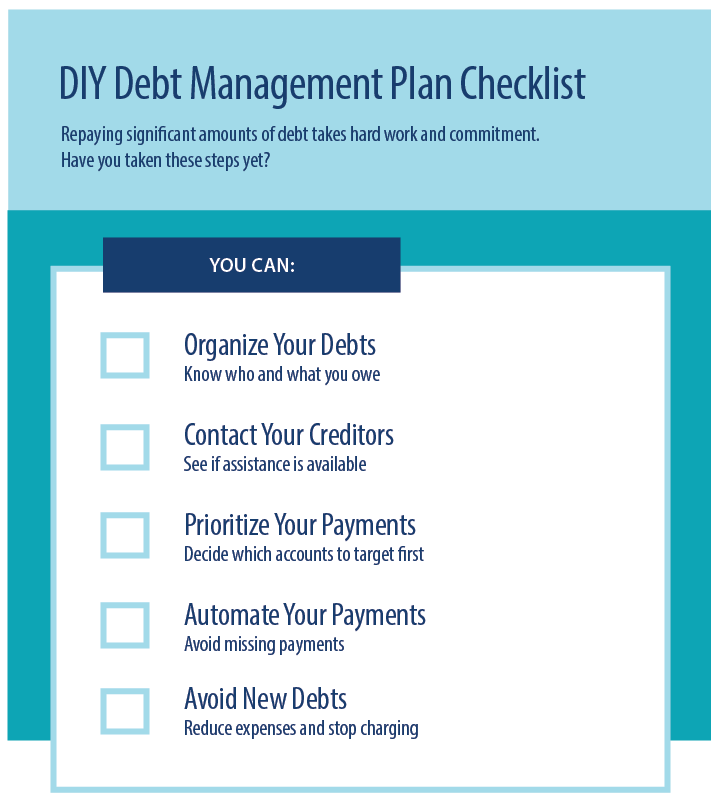Recognizing the Role of Debt Management Plan Services in Financial Planning
Recognizing the Role of Debt Management Plan Services in Financial Planning
Blog Article
Expert Tips and Methods for Executing an Effective Financial Obligation Monitoring Plan
When it comes to navigating the complexities of financial obligation monitoring, having a well-balanced strategy is crucial for achieving monetary security. From examining your existing economic standing to negotiating with creditors, each step plays an essential duty in shaping an effective financial obligation monitoring plan.
Analyzing Your Existing Financial Scenario
Prior to embarking on a financial debt administration strategy, it is vital to thoroughly examine your current monetary standing. Recognizing your monetary situation is the foundational action towards successfully taking care of and decreasing your financial debt.

Creating a Realistic Spending Plan
Understanding your current financial situation lays the groundwork for developing a reasonable budget plan that aligns with your debt management goals and financial capabilities. When creating a budget, it's crucial to accurately track your income, expenditures, and financial debt commitments. Beginning by providing all resources of earnings, consisting of salaries, incentives, and any kind of extra incomes. Next, outline your fixed expenses such as rent or home mortgage settlements, energies, insurance coverage, and car loan repayments. Variable expenses like groceries, entertainment, and transport needs to likewise be represented. By categorizing your expenditures, you can determine areas where you may require to cut down to liberate funds for financial obligation payment.
Prioritizing and Tackling Debts
To properly gain back control of your financial resources and job in the direction of monetary stability, prioritizing and tackling your financial debts is an important step in your financial debt administration plan. Recognize high-interest financial obligations that are costing you the most money and focus on paying them off.
After determining your high-interest debts, take into consideration utilizing strategies like the financial debt snowball or financial debt avalanche technique to pay them off systematically. The financial obligation snowball method entails settling the smallest financial debts initially, while the debt avalanche approach prioritizes debts with the greatest rate of interest. Choose the technique that aligns finest with your economic goals and encourages you to maintain making development.
In addition, consider discussing with creditors for reduced rates of interest or establishing a repayment strategy if you're struggling additional hints to satisfy your existing obligations. Seeking aid from a credit history therapist or monetary consultant can additionally offer useful understandings and guidance on exactly how to properly tackle your debts - debt management plan services. By prioritizing and resolving your financial debts strategically, you can pave the method in the direction of a debt-free future and boosted financial wellness
Discussing With Financial Institutions
When taking part in debt management, discussing with lenders is a crucial action in the direction of locating equally beneficial services for financial obligation payment. Open up interaction with lenders can cause modified layaway plan, minimized rates of interest, or also negotiation offers. Before initiating settlements, it is necessary to have a clear understanding of your financial situation, including your earnings, costs, and the overall amount of financial obligation owed. This information will not only help you make reasonable offers yet additionally show to lenders that you are committed to solving the debt.

Building Healthy Economic Habits
Integrating regular budgeting techniques is important for cultivating healthy and balanced economic habits. Budgeting allows individuals to track their earnings and costs, allowing them to make enlightened choices about their financial concerns. Setting certain economic objectives, such as conserving for emergency situations or retired life, can provide a clear roadmap for managing money efficiently.
One more secret element of structure healthy and balanced monetary routines is living within one's ways. This includes investing much less than what is made and staying clear of unneeded financial obligation. Embracing a thrifty mindset and distinguishing between demands and desires can assist individuals make more prudent spending choices.
Regularly reviewing economic declarations and keeping an eye on credit scores reports are crucial habits that advertise monetary awareness and responsibility. By remaining notified about their economic standing, individuals can identify possible problems at an early stage and take aggressive actions to address them.
Furthermore, developing a cost savings practice, also with tiny amounts, can add substantially to long-term economic safety. Saving consistently not only builds a monetary cushion for unanticipated expenses yet also cultivates a sense of self-control and responsibility towards finance. By consistently exercising these practices, people can lay a solid structure for a steady economic future.
Final Thought
Finally, applying a successful financial debt management strategy needs a comprehensive evaluation of one's financial scenario, the development of a realistic budget plan, prioritizing and taking on debts, discussing with lenders, and building healthy economic routines (debt management plan services). By following these professional pointers and strategies, people can take control of their finances and work towards accomplishing economic stability and freedom from financial obligation
Recognizing your current monetary circumstance lays the foundation for creating a practical budget that aligns with your debt administration objectives and economic capabilities.To effectively restore control of your financial resources and job in the direction of monetary stability, focusing on and tackling your financial obligations is a critical action in your financial debt monitoring strategy.After determining your high-interest financial obligations, think about utilizing techniques like the debt snowball or debt avalanche method to pay them off methodically. The financial debt snowball technique includes paying off the smallest debts first, while the financial debt avalanche approach focuses on debts with the highest interest prices.When engaging in debt management, bargaining with lenders is a vital go to this website step in the direction of discovering mutually beneficial remedies for financial obligation repayment.
Report this page